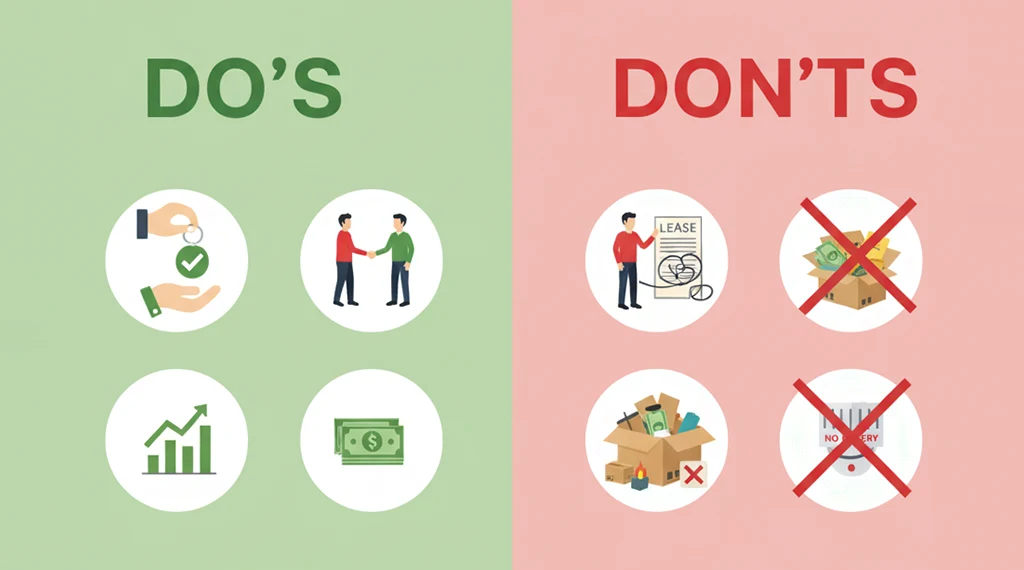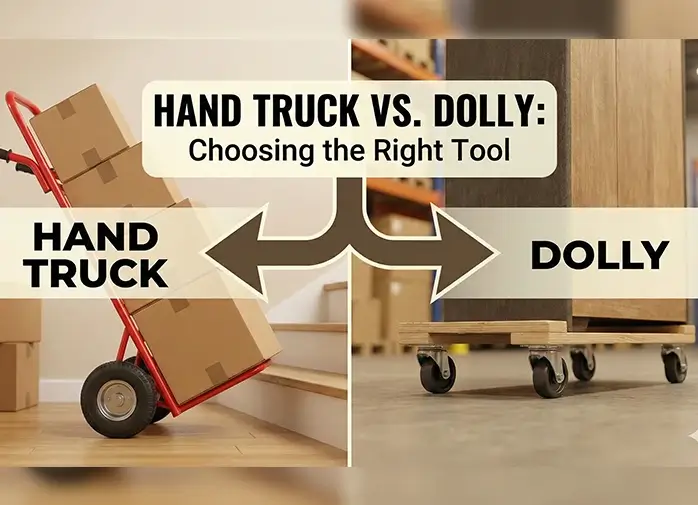Moving Into First Apartment: 20 Do’s and Don’ts for a Smooth Start

Moving into your first apartment is an exciting milestone — it marks the beginning of independence, responsibility, and a new chapter in your life. But with that excitement often comes a fair share of stress. Between budgeting, packing, and managing paperwork, it’s easy to overlook key details that can make or break your first move.
To help you transition smoothly, we’ve created a comprehensive guide of 20 do’s and don’ts for moving into first apartment. From choosing the right apartment to setting up utilities and creating a comfortable home, this checklist will help you avoid common mistakes and move with confidence.
What to Expect When Moving Into First Apartment?
Your first apartment is more than just a place to live — it’s the foundation for your lifestyle. You’ll learn to budget, manage bills, keep up with maintenance, and create a personal space that reflects your style.
But before the excitement takes over, it’s essential to prepare. Many first-time renters underestimate costs, skip reading lease agreements, or overlook safety basics. These small oversights can lead to big headaches later.
Let’s break down the key do’s and don’ts you should follow to make your first apartment experience smooth, affordable, and stress-free.
20 Do's and Don't When Moving into First Apartment
1. Do: Set a Realistic Moving Budget
Before signing any lease or buying furniture, sit down and map out a realistic budget. Consider your income and fixed expenses — rent, utilities, transportation, groceries, and internet.
Include one-time costs like the security deposit, application fees, moving costs, and furniture. Also, plan for monthly recurring costs like utilities, Wi-Fi, renter’s insurance, and parking fees.
A detailed budget helps you avoid last-minute financial surprises and ensures you start your new chapter on stable ground.
1. Don’t: Underestimate Move-In Costs
Many first-time renters forget to budget for hidden costs such as Wi-Fi setup, cleaning supplies, or small household essentials. These expenses can quickly add up.
To avoid running short, create a moving fund at least a month before your move. It’s better to have extra savings than to stretch your finances in the first few weeks.
2. Do: Research Neighborhoods Thoroughly
Your apartment’s location will shape your lifestyle. Research neighborhoods carefully — consider proximity to work or school, access to public transport, safety ratings, and nearby grocery stores.
If possible, visit the area during different times of day to assess traffic, parking, and noise levels. Reading local reviews or joining community groups online can also give you honest insights.
2. Don’t: Sign a Lease Without Reading Every Clause
A lease agreement is a legal contract, and it’s crucial to understand every part of it. Don’t rush through it or sign without clarification.
Check for details such as:
- Lease duration and renewal policy
- Security deposit terms
- Maintenance responsibilities
- Pet and guest policies
- Late payment penalties
If something feels unclear or unfair, ask questions before signing. Once you sign, you’re legally bound to its terms.
3. Do: Inspect the Apartment Thoroughly Before Signing
A walkthrough is essential before committing to a lease. Check for signs of damage, mold, leaky faucets, broken locks, or pests. Turn on lights, open cabinets, and inspect appliances.
Take photos or videos of any issues and share them with your landlord. This protects you from being charged for pre-existing damages when you move out.
3. Don’t: Ignore Red Flags
If the landlord avoids questions, rushes the process, or hesitates to show the property, take it as a warning. Unresponsive landlords or poorly maintained buildings can lead to ongoing issues once you move in.
Trust your instincts — if something feels off, it’s better to keep looking.
4. Do: Start Packing Early and Label Everything
Packing is always more time-consuming than expected. Start at least two weeks early and pack non-essentials first. Label each box by room (e.g., “Kitchen,” “Bathroom,” “Bedroom”) and use color-coded stickers to stay organized.
This not only makes unpacking easier but also ensures nothing gets lost in the move.
4. Don’t: Pack Unnecessary Items
Decluttering before a move is crucial, especially for apartment living where space is limited. Sell, donate, or recycle items you no longer need. Fewer items mean fewer boxes, faster packing, and lower moving costs.
5. Do: Create a First-Night Essentials Box
The first night in your new apartment can be chaotic, so keep a box or bag with essentials you’ll need right away:
- Bedding and pillow
- Change of clothes
- Toiletries
- Charger and electronics
- Snacks and water
- Basic cleaning supplies
You’ll thank yourself later when you can relax without rummaging through multiple boxes.
5. Don’t: Forget to Measure Furniture
Always measure your new apartment’s doorways, elevators, and rooms before moving furniture. Large pieces may not fit or navigate tight stairways.
Avoid frustration and potential damage by confirming measurements ahead of time.
6. Do: Hire Reliable Movers or Plan a Smart DIY Move
If you’re moving a long distance or have heavy items, hiring professional movers like Van Lines Move can save you time and effort. Professionals handle transportation, loading, and even packing if needed.
If you’re doing it yourself, rent a truck, ask friends for help, and ensure everything is packed safely to prevent damage.
6. Don’t: Wait Until the Last Minute
Procrastination leads to stress. Schedule your move weeks in advance — movers book up fast, especially during weekends or the end of the month. Early planning also helps you get better rates and availability.
7. Do: Check Apartment Condition on Move-In Day
Before unpacking, do a final inspection. Ensure everything works as expected — water pressure, outlets, locks, and appliances. Document any issues immediately and notify your landlord.
This creates a paper trail that protects your security deposit later.
7. Don’t: Skip the Move-In Inspection Report
Some landlords require a move-in checklist or report. Never skip this step — it confirms the apartment’s condition when you move in. Without it, you risk being blamed (and charged) for existing damages later.
8. Do: Set Up Utilities Before Moving In
Set up essential services — electricity, gas, water, and internet — a few days before move-in. That way, everything’s running when you arrive.
Contact providers early to schedule installation or activation to avoid delays.
8. Don’t: Assume Everything Is Included
Some apartments include utilities in rent, while others don’t. Confirm which bills you’ll be responsible for — electricity, trash collection, parking, or cable — before you move.
This will help you budget accurately from the start.
9. Do: Create a Basic Tool & Cleaning Kit
A toolkit and cleaning supplies are must-haves for every new renter. Include:
- Hammer, screwdriver, nails, tape measure
- Mop, broom, vacuum
- Trash bags, detergent, sponges
You’ll need them sooner than you think — whether for assembling furniture or fixing minor issues.
9. Don’t: Forget Safety Basics
Your safety comes first. Test smoke alarms, check window locks, and ensure exterior doors are secure.
If the landlord allows, consider adding a door security bar or motion light for added protection.
10. Do: Start with Essentials When Furnishing
Buy furniture gradually. Begin with what you need most — bed, table, chairs, and basic cookware. You can always add décor and extras later.
Prioritizing essentials helps you manage your budget and prevents clutter.
10. Don’t: Overspend on Décor Immediately
It’s tempting to decorate everything at once, but resist the urge. Live in your apartment for a few weeks before deciding on colors or furniture style.
This approach ensures your décor matches your lifestyle and space needs.
11. Do: Use Multifunctional Furniture
Choose pieces that serve multiple purposes — storage ottomans, sofa beds, or foldable tables. They’re great for maximizing space in smaller apartments.
11. Don’t: Ignore Measurements
Always measure before buying large furniture or appliances. Nothing is worse than realizing your couch doesn’t fit through the doorway after delivery.
12. Do: Get to Know Your Neighbors
Introduce yourself to your neighbors early on. Good relationships can make your living experience more pleasant and provide a sense of community and safety.
12. Don’t: Be a Noisy Neighbor
Respect quiet hours and avoid blasting music late at night. Courteous behavior builds goodwill and prevents conflicts.
13. Do: Create a Cleaning Routine
A regular cleaning schedule keeps your apartment tidy and prevents buildup of dust or pests. Assign weekly and monthly tasks like vacuuming, wiping surfaces, and deep cleaning appliances.
13. Don’t: Ignore Maintenance Issues
Small problems like leaks or cracks can become expensive repairs if ignored. Report issues to your landlord promptly to protect your deposit and the apartment’s condition.
14. Do: Pay Rent and Bills on Time
Timely payments help you build a positive rental history and avoid late fees. Automate payments or set calendar reminders to stay on track.
14. Don’t: Forget to Budget for Groceries and Transportation
Beyond rent and utilities, everyday costs like food and travel can impact your budget. Track your spending monthly and adjust as needed.
15. Do: Get Renter’s Insurance
Renter’s insurance is affordable and covers your belongings from theft, fire, or damage. It also provides liability protection in case of accidents.
15. Don’t: Skip Reading the Fine Print
Not all insurance policies are the same. Review coverage limits, exclusions, and deductibles before purchasing.
16. Do: Personalize Your Space
Turn your apartment into a home with simple touches — plants, rugs, photos, and artwork. Choose budget-friendly décor ideas that reflect your personality.
16. Don’t: Violate Lease Rules
Before making any changes like painting walls or hanging shelves, confirm with your landlord. Unauthorized modifications can cost you your deposit.
17. Do: Learn Basic DIY Repairs
Know how to tighten screws, unclog drains, or replace light bulbs. Basic maintenance skills save time and keep your apartment functional.
17. Don’t: Attempt Major Repairs Yourself
For bigger issues like electrical problems or water leaks, contact your landlord or a professional. Attempting repairs yourself could cause damage or violate your lease.
18. Do: Prioritize Apartment Security
If permitted, change locks after moving in or install additional security measures like a door jammer or camera doorbell.
Feeling secure will help you settle in comfortably.
18. Don’t: Share Spare Keys Carelessly
Avoid giving spare keys to casual acquaintances. Keep access limited to trusted friends or family.
19. Do: Establish a Routine
Balance work, chores, cooking, and relaxation. A consistent routine reduces stress and helps you manage responsibilities effectively.
19. Don’t: Isolate Yourself
While independence is great, loneliness can sneak in. Attend community events or invite friends over to stay socially connected.
20. Do: Keep Track of Apartment Documents
Organize your lease, rent receipts, and maintenance records. These documents are vital for future references or disputes.
20. Don’t: Leave Without Proper Notice
When it’s time to move out, give your landlord the required notice — usually 30 to 60 days. Follow the lease rules for cleaning and key return to secure your deposit.
Conclusion
Moving into first apartment is one of life’s most rewarding experiences. With the right mindset, preparation, and awareness, you can avoid common mistakes and enjoy your independence with confidence.
By following these 20 do’s and don’ts, you’ll not only protect your finances and belongings but also create a home that truly feels like yours.
Whether you’re moving across town or to a new state, Van Lines Move is here to make your first move seamless and stress-free. From professional packing to transportation, we handle the heavy lifting so you can focus on settling into your new home.
Ready to move into your first apartment?
Get a free moving quote today at VanLinesMove.com.
Categories
- Long Distance Moving154
- Local Moving120
- Commercial Moving40
- Residential Moving34
- Last – Minute Moving25
- Moving Tips & Lifestyle10
- Furniture Moving9
- Moving Tips & How-To Guides8
- Moving services7
- Moving Cost5
- Moving Cost Calculator5
- Moving Costs & Budgeting5
- moving tips4
- Moving companies4
- state to state movers4
- Moving Tips4
- Piano Moving3
- Car Transportation3
- Truck Rental3
- Local Move3
- best moving rates3
- cheap moving companies3
- affordable moving companies3
- full-service movers3
- Moving3
- Moving Cost Guides3
- Moving Tips & Planning3
- Junk Removal2
- Moving Container2
- Senior Moving2
- Senior Relocation Moving Companies2
- Moving Tools2
- Moving Estimates2
- interstate moving2
- College Moving2
- Dorm Moving2
- Tips for moving2
- cross-country move2
- International moving2
- Household moving2
- Long-Distance Moving2
- Relocation Guide2
- Moving Tips & State Guides2
- Heavy Equipment1
- Senior Moving Services1
- office moving1
- office relocation1
- employee relocation1
- Car Transport1
- Vehicle Shipping1
- Car Shipping Services1
- Artificial Intelligence1
- Office Moving Services1
- Commercial Moving Companies1
- Corporate Moving Services1
- Corporate Movers1
- full-service moving companies1
- sustainable moving companies1
- green movers1
- Moving in US1
- Best places to move in 20251
- 2025 moving1
- Full-Service Moving Companies1
- College moving services1
- Moving to College1
- Moving Season1
- Spring Moving1
- donate1
- sell1
- Movers in California1
- Movers in Studio City1
- Moving to California1
- Laws about Moving into California1
- Moving Laws1
- House moving1
- packing1
- cheap moving ways1
- Moving guide1
- moving across countries1
- international relocation program1
- move out cleaning1
- right packing supplies1
- pack while moving1
- Apartment moving1
- PODS1
- moving out1
- state to state move1
- California movers1
- Truck Rental1
- US Territory Relocation1
- International Moving1
- Shipping & Moving Tips1
- Moving Budget Guide1
- Relocation Guides & Incentives1
- Moving Tools & Equipment Guides1
- Moving Services & Options1
- Moving Tips & How-To Guides1
- Moving Day & Settling In1
- Mobile Home Moving1
- Moving Guide & Tips1
- Moving Tips & State Comparisons1
- Moving Tips & City Guides1
- Moving Tips & Cost Guides1
- Long-Distance Moving Tips1
- Moving Tips & Financial Planning1
- Moving Tips & Home Preparation1
- Vehicle Shipping & Auto Transport1
- Marketing & Lead Generation1
- International Moving Guides1
- Moving Costs1
- San Francisco Moving Guide1
- NYC Moving1
- Local Movers1
- Budget Moving1
- Student Moving1
- Affordable Moving1
- Specialty Moving Guides1
- Local & Long-Distance Moving1
- Boston Moving Guide1
- Europe Relocation Guide1
- Moving Costs & Specialty Moving1
- Cost of Living1
- Relocation1
- International Moving1
- Moving Guides1
- Lifestyle & Relocation1
- State Guides1
- Home Buying Guide1
- Moving Timeline1
- Real Estate Tips1
- Appliance Moving1
- Packing & Preparation1
- Interstate Relocation1
- City-to-City Moving Guide1
- Technology for Movers1
- Moving Reviews1
- Moving Costs & Storage1
- Moving Tips & Equipment Guides1
- Moving Guides & Cost Insights1
- Moving Supplies1
- Packing Tips1
- Home Moving1
Archives
Recent posts
-
.webp)
Plastic Wrap for Moving: The Ultimate Guide to Protecting Your Belongings
February 2026 -

What Is an Interstate Move? Everything You Need to Know Before Moving Across State Lines
February 2026 -

North American Van Lines Reviews: Is It Worth the Cost in 2026?
February 2026 -

Hand Truck vs Dolly: Which One Is Better for Moving and Heavy Lifting?
January 2026

 Local Movers
Local Movers Last-Minute Movers
Last-Minute Movers Junk Removal
Junk Removal Long Distance Movers
Long Distance Movers Piano Movers
Piano Movers Heavy Equipment
Heavy Equipment Commercial Movers
Commercial Movers Moving Container
Moving Container Car Transportation
Car Transportation Furniture Movers
Furniture Movers Truck Rental
Truck Rental Moving Cost Calculator
Moving Cost Calculator Moving Planner
Moving Planner Packing Calculator
Packing Calculator Moving Checklist
Moving Checklist Moving Insurance
Moving Insurance FAQ
FAQ Contact Us
Contact Us Moving Loan
Moving Loan About Us
About Us







